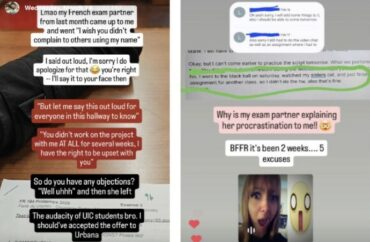
University’s actions were ‘undoubtedly chilling and threatened the student’s free speech rights,’ legal group says
The University of Illinois at Chicago has dropped its investigation into a student’s online complaints about a group partner after a campus legal organization got involved.
Haley Gluhanich at the Foundation for Individual Rights and Expression called the university’s actions “undoubtedly chilling and threatened the student’s free speech rights.”
She told The College Fix in a recent interview that the university dropped the investigation just six days after FIRE sent a letter opposing its investigation earlier this month. She said the university also confirmed the student, Marie Ching, “will not face any punishment.”
The investigation began on April 1, after the university contacted Ching about a series of Instagram story posts that she wrote criticizing a group partner, according to FIRE’s letter to the university.
In two meetings with Ching on April 7 and 9, UIC claimed the posts may constitute harassment or cyberbullying and asked Ching to submit a “written ‘statement about what happened,'” according to FIRE.
The Instagram posts, (pictured) which Ching wrote in February and March, criticized another student for their lack of participation in a group project. In one, Ching complained about her partner’s failure to help her with a script.
“It really pissed me off when my partner read the script. Knowing that I wrote 100% of it. I know it’s not a big deal. But damn, everyone else’s partners seemed like they actually cared. So I’m jealous,” she wrote. “I loved seeing everyone else genuinely act/joke/enjoy it. So it felt embarrassing that my partner was so lazy and proud of it too.”
These posts may be offensive to the student they are calling out, but, according to FIRE, are in no way punishable by the university.
Since UIC is a public university, it is bound by the First Amendment and therefore cannot discipline or investigate a student for complaints about speech that just offended another student. According to FIRE, “… nothing about Ching’s posts can be construed as severe or objectively offensive, nor were the posts discriminatory on the basis of a protected class,” therefore her speech is protected.
Gluhanich, FIRE’s senior program counsel, clarified to The College Fix that the public nature of social media doesn’t change anything.
“That Ching posted her criticisms on social media does not change the analysis. She has every right to share these grievances online,” Gluhanich said.
In an April 11 letter to the university, Gluhanich laid out these points, and also advised the university that it could have handled the complaint without an investigation.
“To abide by its constitutional obligation to protect free speech, when UIC receives a complaint, it should undertake a cursory review … to first determine whether the conduct alleged solely constitutes protected expression,” she wrote.
If the speech is protected, the university can then offer support for the student who filed the complaint without involving the accused, her letter states.
When contacted about the matter, the university media relations office told The Fix in a statement, “The University of Illinois Chicago is strongly committed to the free speech rights of its students. Due to federal privacy laws, we cannot confirm or deny whether a student is currently under a student conduct process review.”
Although protected speech, social media posts like Ching’s can have an impact on students, a family therapist told The Fix.
Ryanne Mellick, a Minnesota therapist who specializes in parenting, frequently speaks about the impact of social media on adolescents. When asked about the case, she told The College Fix that she wasn’t surprised.
“As a professional, this is not surprising to me, primarily because kids have not learned how to communicate effectively with other people in real life,” Mellick said. “So, because of this, they turn to social media to air their grievances, which results in everyone finding out and then this ripple effect occurs that the student who is being complained about cannot do anything about.”
Mellick also commented on the effects social media has had on young adults.
“In my personal experience, as a therapist, students have a difficult time keeping much of their lives private due to social media. Between all the different ways for them to communicate, there has developed a way of oversharing and over communicating that many students and generations before did not have or experience,” she told The Fix.
“Much of the impacts I have heard and encountered have been negative due to the fact that there are no lines of what is appropriate or not to share on a social media platform,” she said.
MORE: U. Michigan blows own deadline for handing over documents on Lori Lightfoot’s teaching gig
IMAGE CAPTION AND CREDIT: Social media posts by a University of Illinois at Chicago student prompted an investigation by the institution. Foundation for Individual Rights and Expression/Instagram
Like The College Fix on Facebook / Follow us on Twitter






Please join the conversation about our stories on Facebook, Twitter, Instagram, Reddit, MeWe, Rumble, Gab, Minds and Gettr.